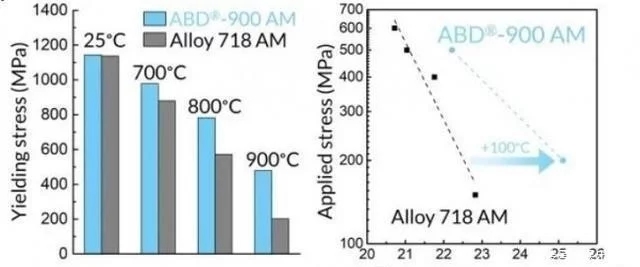Honeywell conducted a series of tests to confirm and optimize the performance of the alloy, and obtained some very positive results. The test starts from the following points.
l Manufacturability
The focus is to evaluate the alloy performance of the ABD-900AM nickel-based superalloy material during L-PBF additive manufacturing, and whether the thermal gradient generated in this process will damage the integrity of the final part. Honeywell tried various test geometries in the German EOS metal 3D printing system, and carried out a component scale test, and found that there was no deformation caused by cracks under the printing conditions, and the tested parts had good surface finish.
l Powder recyclability
When considering the economics of using metal additive manufacturing processes, being able to reuse molten powder is an important factor. Honeywell tested the recycled powder, and compared with the new powder, the performance of the parts made from the recycled powder did not change significantly.
l Post-processing capabilities
3D printed parts usually require post-processing, and the post-processing process may affect the mechanical properties of the material, thereby affecting the function of the part. Vacuum heat treatment and hot isostatic pressing (HIP) are often used to eliminate internal voids in metal 3D printed parts. Honeywell has also conducted corresponding tests. No welding is found on the post-processed ABD-900AM material 3D printed parts. After "crack.

l Tensile test
Honeywell conducted the ASTM standard tensile test to measure the tensile strength, breaking strength, maximum elongation, and area reduction between 427°C and 927°C in two construction directions. The test shows that the test points have good repeatability, and the high temperature strength of the ABD-900AM material is comparable to that of traditional cast nickel alloys.
l Low cycle fatigue test
Low-cycle fatigue (LCF) is a low-cycle durability test in which components are subjected to mechanical cyclic plastic strain, resulting in fatigue failure in a short period of time. Honeywell conducted a low-cycle fatigue test on the ABD-900AM material at 650°C. The results showed that the ABD-900AM material parts that have not undergone hot isostatic pressing have better performance than the 718 alloy that has undergone hot isostatic pressing. Performance.
The results of the work between Honeywell and Alloyed show that ABD-900AM has good welding and melting properties. Although the ABD900AM material cannot replace the CM Mar-247 material for casting due to its oxidation properties in most cases, it does have very good mechanical properties at high temperatures compared to Mar 247, IN792, IN713 or IN738.


